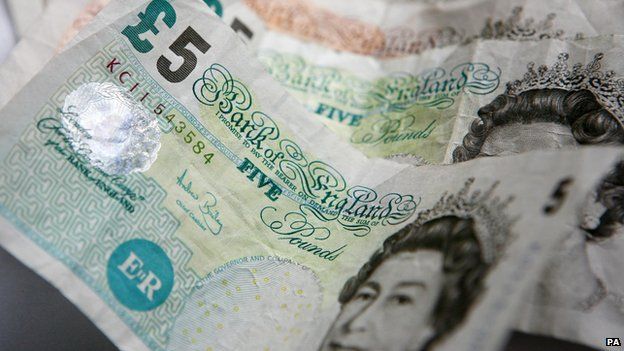Low-paid Britons now number five million, think tank concludes
- Published
- comments

A record five million UK workers are now in low-paid jobs, research from a think tank suggests.
Those earning less than two thirds of median hourly pay - equivalent to £7.69 an hour - rose by 250,000 to 5.2m last year, the Resolution Foundation said.
It said a "growing rump" of low-paid jobs was a problem for ministers because it kept tax revenues low.
The government said it had taken lower earners out of income tax and wanted to raise the value of the minimum wage.
Workers in Britain were more likely to be low paid than workers in comparable economies like Germany and Australia, the left-of-centre think tank's report said.
Last week, tens of thousands of people protested in London, Glasgow and Belfast about pay and austerity.
Teachers, nurses and civil servants were among those opposing a below-inflation 1% pay offer from the government.
The report said there was a serious problem of people being stuck in low-paid jobs, with almost one in four minimum wage employees still on that rate for the last five years.
The minimum wage, set by the government, rose 19 pence at the start of October to £6.50.
The UK living wage, promoted by the Living Wage Foundation, is currently £7.65, and £8.80 in London.
'Squeeze continues'
The Resolution Foundation's chief economist, Matthew Whittaker, described the figures as "troubling".
He said: "While recent months have brought much welcome news on the number of people moving into employment, the squeeze on real earnings continues.
"Being low paid, and getting stuck there for years on end, creates not only immediate financial pressures, but can permanently affect people's career prospects.
"A growing rump of low-paid jobs also presents a financial headache for the government because it fails to boost the tax take and raises the benefits bill for working people."
Shadow treasury minister Catherine McKinnell said most people were "still not feeling the recovery".
Meanwhile, Trades Union Congress general secretary Frances O'Grady said many of the jobs created in the last few years "were very much of the low-paid, casual and zero-hours variety".
"This risks many people and their families simply being left behind, unable to share in any benefit from the economic recovery," she added.
A Department of Business, Innovation & Skills spokesman said: "We have taken continued action to help low-paid workers by taking lower earners out of income tax and asking the Low Pay Commission to consider how we can further increase the real value of the national minimum wage, without having an adverse impact on jobs."
- Published14 August 2014
- Published3 July 2014
- Published24 June 2014